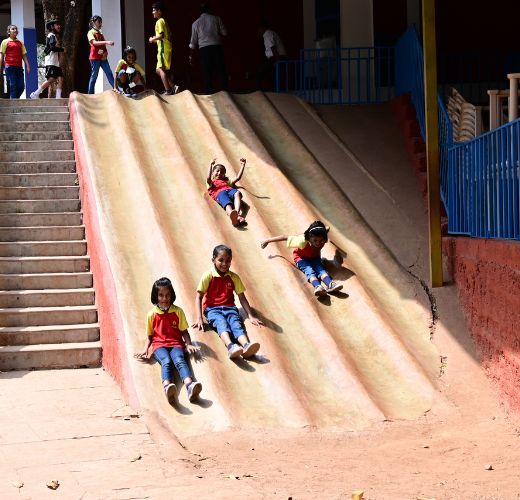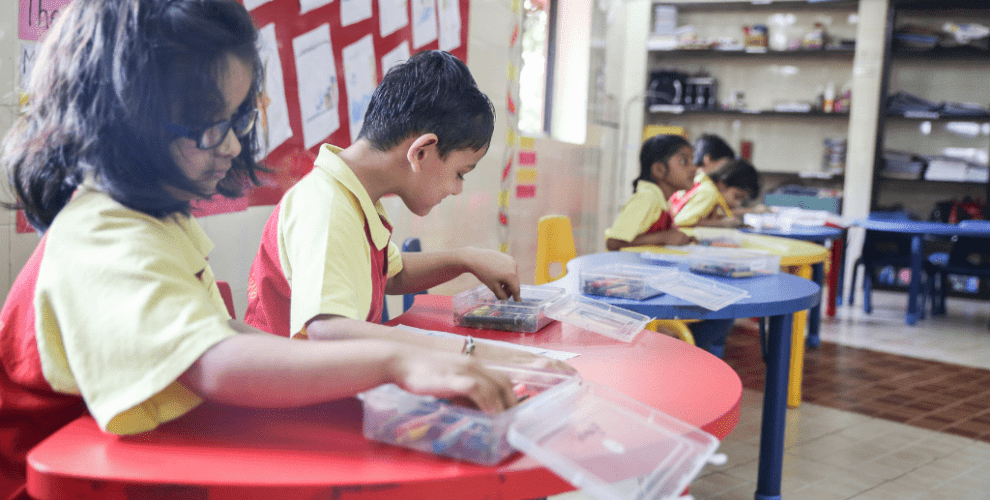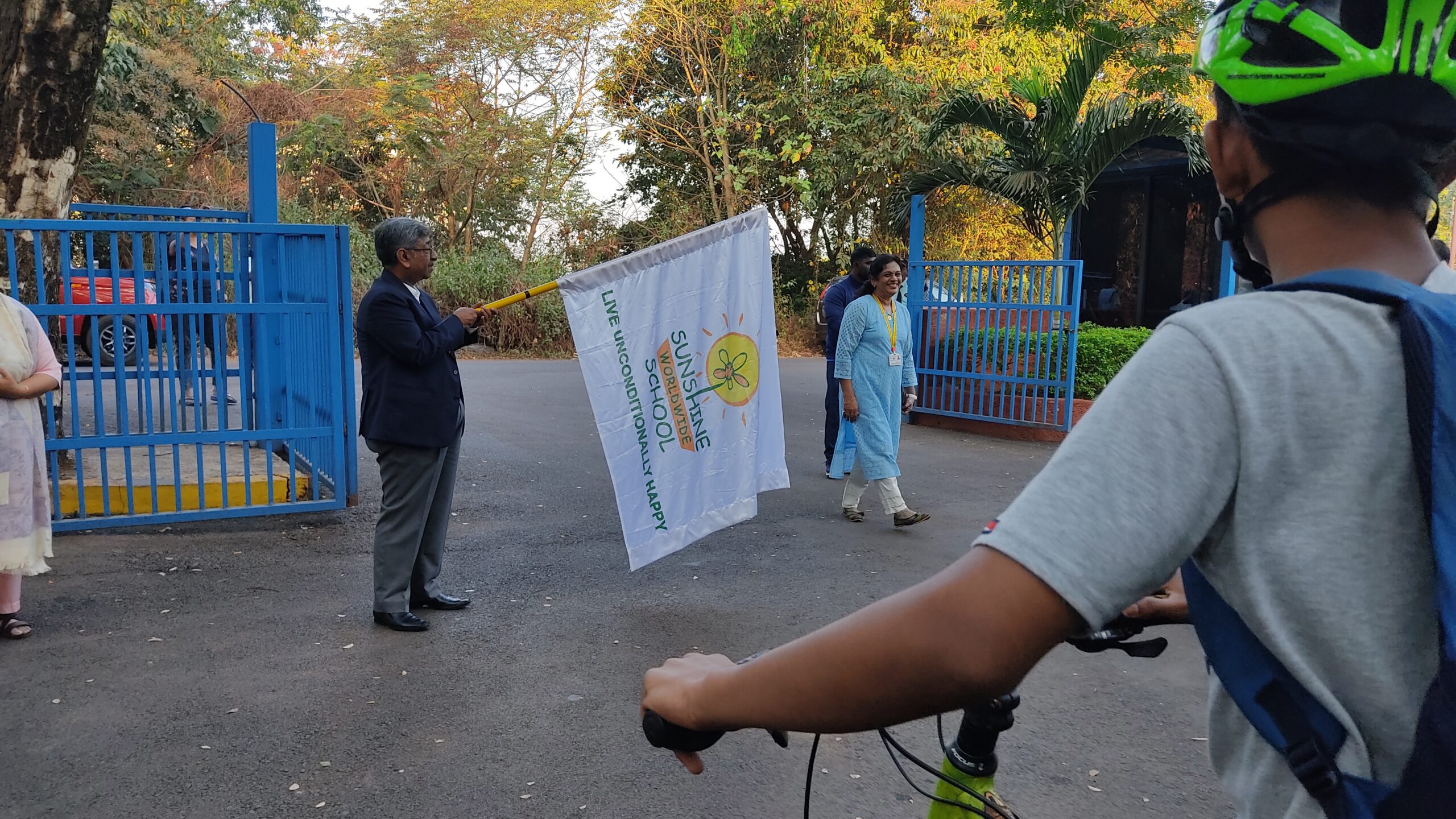Play-based learning is a key feature of IB Education. Play-based learning is a form of learning where the primary mode of learning is through play. It is a type of early childhood education based on child-led and open-ended play. This mode of learning is unique to the best international schools in Goa.
Children are naturally drawn to play, they learn by interacting with their surroundings and learn to tackle new experiences after every interaction.
Studies have shown that play-based learning builds curiosity and excitement in children. Play-based learning helps children develop several skills like social, self-sufficient, mathematics and even language.
We may have an idea what play may look like but it can be confusing exactly what it is.
 Teachers form a key component of successful play-based learning, as they observe the children at play and document their interactions, interests and needs. Sunshine Worldwide School employs the best teachers and constantly trains them on the latest educational practices and methodologies so that students may get the best education. Our commitment to constant improvement has made us one of the best CBSE schools in Goa.
Using special assessment tools the learners’ strengths and weaknesses are recorded in order to improve upon them. With this continuous assessment, the learning environment is then altered in order to give the learner a rich and holistic learning experience.
Sunshine Worldwide School being one of the top schools in Goa, brings “Play” to the classroom by planning and setting up the learning environment of the children in the form of having different classroom settings, materials and resources used etc. Which helps the child get an immersive learning experience. We are one of the few Schools in Panjim that offers an IB-PYP programme.
Teachers form a key component of successful play-based learning, as they observe the children at play and document their interactions, interests and needs. Sunshine Worldwide School employs the best teachers and constantly trains them on the latest educational practices and methodologies so that students may get the best education. Our commitment to constant improvement has made us one of the best CBSE schools in Goa.
Using special assessment tools the learners’ strengths and weaknesses are recorded in order to improve upon them. With this continuous assessment, the learning environment is then altered in order to give the learner a rich and holistic learning experience.
Sunshine Worldwide School being one of the top schools in Goa, brings “Play” to the classroom by planning and setting up the learning environment of the children in the form of having different classroom settings, materials and resources used etc. Which helps the child get an immersive learning experience. We are one of the few Schools in Panjim that offers an IB-PYP programme.
5 key characteristics of play according to IB School Guidelines are:
- Play is meaningful – children play to make sense of the world around them, and to find meaning in an experience by connecting it to something already known.
- Play is joyful – of course, play may have its frustrations and challenges, but the overall feeling is one of enjoyment, motivation, thrill and pleasure.

- Play is actively engaging – watch children playing, and you will usually see that they become deeply involved, often coming to a physical, mental and verbal engagement.
- Play is iterative – play is not static. Children play to practice skills, try out possibilities, revise hypotheses and discover new challenges, leading to deeper learning.
- Play is socially interactive – play allows children to communicate ideas, to understand others through social interaction, paving the way to build deeper understanding and more powerful relationships.
 Teachers form a key component of successful play-based learning, as they observe the children at play and document their interactions, interests and needs. Sunshine Worldwide School employs the best teachers and constantly trains them on the latest educational practices and methodologies so that students may get the best education. Our commitment to constant improvement has made us one of the best CBSE schools in Goa.
Using special assessment tools the learners’ strengths and weaknesses are recorded in order to improve upon them. With this continuous assessment, the learning environment is then altered in order to give the learner a rich and holistic learning experience.
Sunshine Worldwide School being one of the top schools in Goa, brings “Play” to the classroom by planning and setting up the learning environment of the children in the form of having different classroom settings, materials and resources used etc. Which helps the child get an immersive learning experience. We are one of the few Schools in Panjim that offers an IB-PYP programme.
Teachers form a key component of successful play-based learning, as they observe the children at play and document their interactions, interests and needs. Sunshine Worldwide School employs the best teachers and constantly trains them on the latest educational practices and methodologies so that students may get the best education. Our commitment to constant improvement has made us one of the best CBSE schools in Goa.
Using special assessment tools the learners’ strengths and weaknesses are recorded in order to improve upon them. With this continuous assessment, the learning environment is then altered in order to give the learner a rich and holistic learning experience.
Sunshine Worldwide School being one of the top schools in Goa, brings “Play” to the classroom by planning and setting up the learning environment of the children in the form of having different classroom settings, materials and resources used etc. Which helps the child get an immersive learning experience. We are one of the few Schools in Panjim that offers an IB-PYP programme.



Leave a Reply